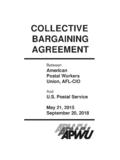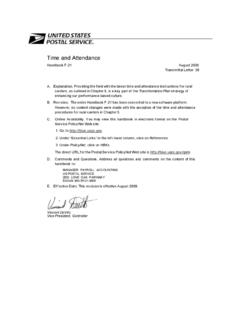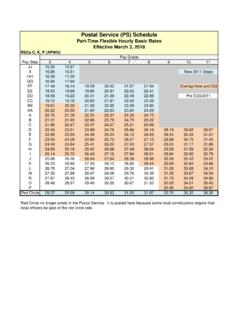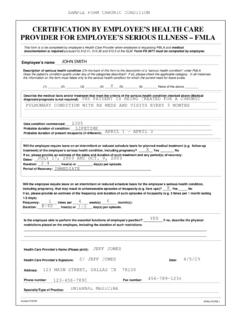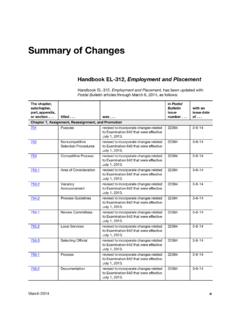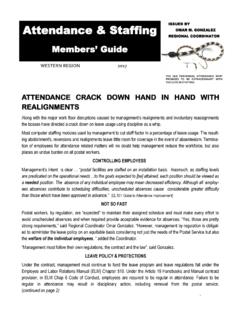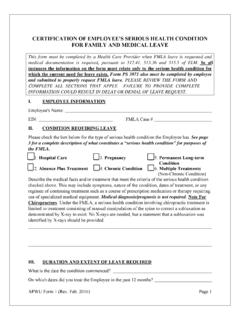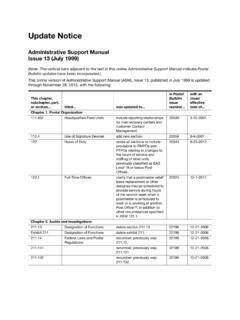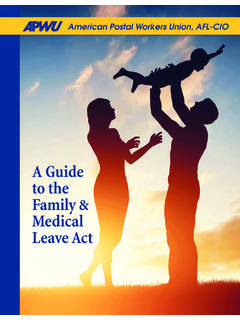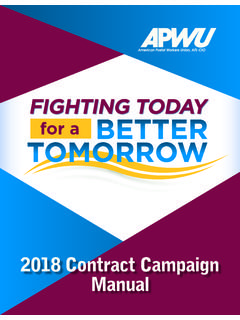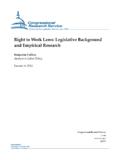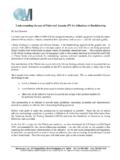Transcription of INTEREST ARBITRATION DECISION AND AWARD …
1 BEFORE THE INTEREST ARBITRATION PANEL In the Matter of: _____ UNITED STATES POSTAL SERVICE ) ) Employer ) ) -and- ) 2015 National Agreement ) AMERICAN POSTAL WORKERS UNION, AFL-CIO ) ) Union ) _____ ) INTEREST ARBITRATION DECISION AND AWARD Effective Date: July 8, 2016 INTEREST ARBITRATION PANEL STEPHEN B. GOLDBERG, Neutral Chair ROBERT A. DUFEK, USPS Member PHILLIP TABBITA, APWU Member Appearances: United States Postal Service Kevin B. Rachel Lead Advocate, Collective Bargaining and ARBITRATION Carl C. Bosland Chief Counsel, Labor Law Brian M. Reimer Senior Litigation Counsel, Labor Law Katherine S. Attridge Attorney, Labor Law American Postal Workers Union, AFL-CIO MURPHY ANDERSON PLLC Anton G.
2 Hajjar Melinda K. Holmes Michael T. Anderson Arlus J. Stephens Jeremiah Fugit Divya Vasudevan 2 I. INTRODUCTION This INTEREST ARBITRATION Panel was convened pursuant to 39 Section 1207(c) of the Postal Reorganization Act (PRA) to resolve an impasse over the terms of the next National Agreement between the United States Postal Service ( Postal Service ) and the American Postal Workers Union, AFL-CIO ( APWU or Union ). In reaching its DECISION , the Panel has carefully considered the arguments and evidence submitted by the parties, relevant statutory provisions and their legislative history, past INTEREST ARBITRATION awards , and postal labor negotiations history. The Panel appreciates the vigorous and constructive role undertaken by each of the parties as they advanced their respective positions.
3 II. BACKGROUND The 2010 Agreement between the Postal Service and the APWU expired on May 20, 2015. Despite extensive negotiations and mediation under 39 1207(b), the parties were unable to settle on terms for a new National Agreement. This Panel was established to resolve their impasse, which includes issues of both economics and working conditions. The Chairman of the Panel was mutually selected by the parties, who also designated their own members of the Panel as required by the PRA. The APWU appointed Phillip Tabbita, APWU Manager, Negotiations Support and Special Projects, and the Postal Service appointed Robert A. Dufek, Postal Service Manager, Labor Relations Strategies. The parties filed extensive and informative pre-hearing briefs on February 12, 2016, setting forth what each viewed as the important issues in dispute, as well as how the Panel should decide those issues.
4 On February 17, 2016, the first day of hearings, 3 the parties presented lengthy opening statements that elaborated on the positions they had taken in their pre-hearing briefs. between February 17 and April 28, 2016, the Panel held eighteen days of hearing in Washington, , during which both sides presented numerous witnesses and exhibits. The transcript of hearing testimony is over 3,000 pages long, and is supplemented by written testimony, attorney presentations, and over 350 exhibits. At the direction of the Chairman, the Panel received additional evidence in executive session, all of which is part of the record of this proceeding. The logistical effort required to manage this volume of material was great, and we would be remiss not to thank the APWU and Postal Service support staff, without whom these proceedings would not have proceeded nearly as smoothly and efficiently as they did.
5 The evidence introduced in these proceedings was a reminder of the importance of the United States Postal Service in connecting our country, and the vital role Postal Service employees serve in fulfilling its mission. It was a pleasure to see inside the Postal Service s operations through the testimony of its managers and employees, and to consider important issues critical to their work. One such issue, to which we now turn, is the compensation and benefits of career 1 The compensation and benefits of Postal Support Employees are addressed in Section IV of the AWARD . 4 III. ECONOMIC ISSUES2 A. Compensation and Benefits 1. Statutory Background The Postal Reorganization Act of 1970 (PRA) requires that the compensation and benefits of Postal Service employees shall be comparable to those paid in the private sector.
6 Title 39 101(c), provides: As an employer, the Postal Service shall achieve and maintain compensation for its officers and employees comparable to the rates and types of compensation paid in the private sector of the economy of the United States. Similarly, Title 39 1003(a), provides in part: It shall be the policy of the Postal Service to maintain compensation and benefits for all officers and employees on a standard of comparability to the compensation and benefits paid for comparable levels of work in the private sector of the The comparability mandate is augmented in Section 101(c) by the following: [The Postal Service] shall place particular emphasis upon opportunities for career advancements of all officers and employees and the achievement of worthwhile and satisfying careers in the service of the United States.
7 2. The Financial Condition of the Postal Service The evidence clearly shows the Postal Service to be in a difficult financial position. This is due in substantial part, albeit not entirely, to the diversion of First-Class Mail to electronic communications, coupled with an expanding delivery network to which the Postal Service must deliver fewer mail pieces. Because of the loss of much of its First-Class Mail revenue, the Postal Service asserts that it must, as a matter of survival, increasingly focus on new services and products such as the packages and parcels 2 The Opinion that follows is that of the Chairman, informed by the advice and counsel of Panel members Robert A. Dufek and Phillip Tabbita.
8 5 delivery market. Just as the First-Class Mail market is shrinking due to electronic competition, the market for the delivery of packages and parcels is expanding as a result of the shipping of purchases made on the Internet. The packages and parcels delivery market is, however, extremely competitive, with several large nationwide delivery services seeking to expand their market share, often competing with each other and the Postal Service on price to do so. All of these factors, according to the Postal Service, require it to keep its labor costs under control. The Union concedes that the Postal Service is facing significant financial challenges, but points out that the PRA is clear in requiring the ARBITRATION Panel to base its AWARD solely on the comparability of Postal Service wages and benefits to those in the private sector, not on the Postal Service s financial condition.
9 To be sure, the Union voluntarily made financial concessions in the 2010 Agreement, at a time when, it asserts, the Postal Service s financial condition was far worse than it is today, but that, the Union asserts, does not authorize the Arbitrator to impose wage and benefit concessions in the 2015 Agreement. The Union concludes, and the Postal Service does not disagree, that the Arbitrator has no choice under the PRA, but must base his wage and benefit AWARD solely on comparability, not on the financial condition of the Postal In rendering this AWARD , I acknowledge the financial problems affecting the Postal Service, but accept, as I must, the primacy of the statutory comparability 3 Nor, the parties agree, is this conclusion altered by the Postal Accountability and Enhancement Act of 2006 (PAEA)
10 , even though that Act imposed a fundamental shift in the Postal Service s business from a break-even model in which costs were passed through to customers to a profit-or-loss model that requires the Postal Service to successfully manage its costs. In brief, the cost-control mandate of the PAEA does not alter the application of the comparability mandate as the governing standard for determining Postal Service compensation and benefits. 6 standard in fashioning an AWARD on the wages and benefits of APWU-represented employees. I also note that even greater freedom on my part to determine an appropriate level of wages and benefits would be insufficient to provide a meaningful solution to the Postal Service s financial problems.
